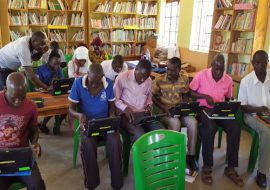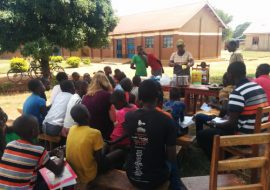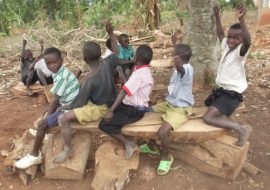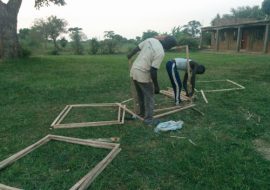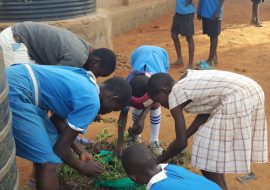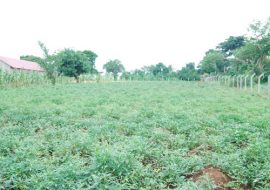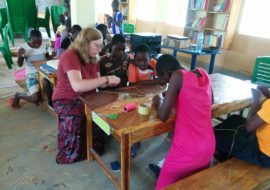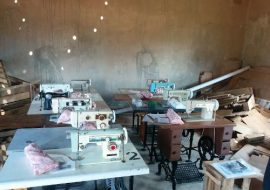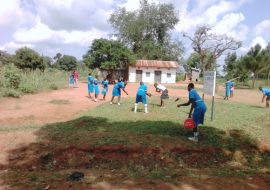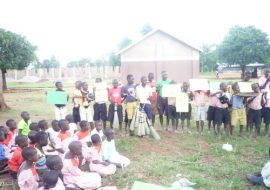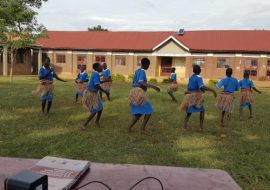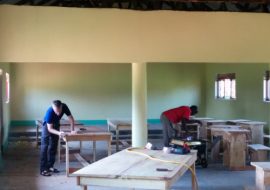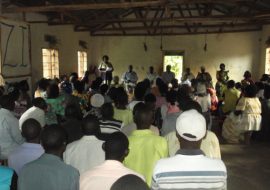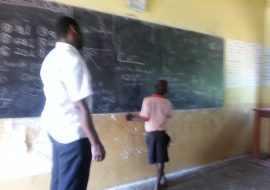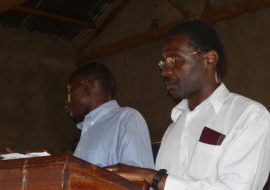C. Boost Student Welfare
Girls in Nakyere village face multiple barriers to education caused by poverty, physical distance from school, and cultural norms and practices, which perpetuate inequality between boys’ and girls’ opportunities to access quality education. Child labor is one of the consequences of extreme poverty as families seek to improve their incomes by using children as farm laborers, cattle keepers, child brides, or housemaids for working families.
a) Boarding Section
Since the marginalization of girls stems from traditional cultural beliefs and practices on gender roles, community sensitization is critical to supporting girls’ enrollment and retention. We are working to remove the barriers to education by providing a safe learning environment that protects students from exploitation and organized crime.
The boarding section was initially started to help candidate classes study at night, help children who travel long distances, and support girls who are at risk. The demand for girls’ bed availability increased exponentially, so we are constructing an additional dormitory for girls.
Students who reside in our school dormitory can focus on their education in a supportive environment with fewer distractions. They also develop life skills such as time management, work ethics, and responsibility and receive additional support before and after school from resident teachers. Girls have thrived, and their performance and retention have improved. Many of these children have moved on to high school, and some have found gainful employment.
b) Sanitary Pad Program
Widespread poverty, especially in rural areas, limits women and girls to afford decent, sanitary materials like pads to use during their menstrual periods. Many girls miss school every month due to a lack of pads. This greatly affects their education, which can contribute to school dropout.
For over ten years, we have provided girls with reusable pads, water, and handwashing facilities to help them during their periods; there are fewer school absences during monthly periods. We plan to teach children how to make reusable pads in the future.
c) School Food and Nutrition
School feeding is part of our strategy to address children's hunger and to enable children from low-income families to stay in school all day. Good health and proper nutrition, combined with quality education, can improve school attendance, learning focus, and overall education attainment.
We currently provide a cup of cornmeal porridge for most children. Our school garden can yield good amounts of corn, beans, sweet potatoes, and soya beans to feed boarding students during good seasons. We have started animal farming of rabbits and goats. As the number of animals increases, we shall provide the children with better nutrition, including proteins.
The goal is to provide fortified breakfast and lunch to all children to alleviate short-term hunger, improve cognition, and address micronutrient deficiencies by including protein, iron, vitamin C, and Iodine. We hope to rent or purchase land to start large-scale gardens to grow a variety of foods and vegetables to feed the children and educate parents on nutrition and modern farming methods.
d) Holiday feeding Program
This takes place during the long break from December to February when many children are at risk of going without food. We increased the outreach efforts to the children with the help of our supporters. In 2022, the holiday feeding program provided a daily meal to an average of 80 children per day. For 2023, we are averaging 90 children per day.
e) Character and Spiritual Development
Student well-being is strongly linked to learning and creates positive feelings and attitudes, positive relationships, resilience, and high satisfaction levels with learning experiences.
Our character education program is integrated into all aspects of the school through the Sunshine Reward program for good behavior to create a safe, caring, and inclusive learning environment for students that supports academic development.
Our social education program helps students understand social values such as courtesy, consideration of others, cooperative group interactions, self-control, and respect for authority. It instills fairness, respect, and honesty in students as part of everyday lessons in and out of the classroom.
Our spiritual development program prepares students to follow a lifestyle where they serve others, live out their faith, and affect change in those around them and worldwide. It promotes an understanding that everyone has value regardless of creed or religious affiliation, as manifested through their relationships with others.

